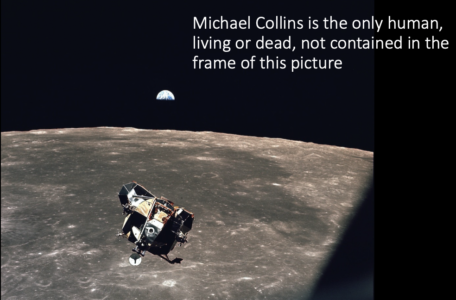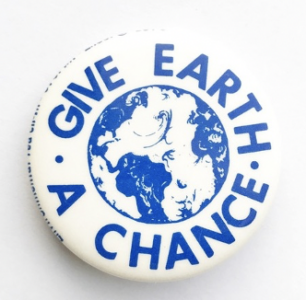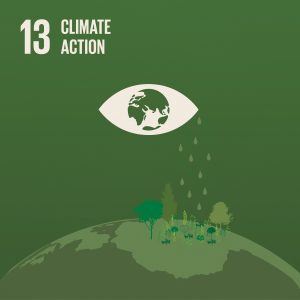“…a new type of thinking is essential if mankind is to survive and move toward higher levels.” Albert Einstein
In July of 1969, as he floated alone above the moon while Neil Armstrong and Buzz Aldrin walked on the moon, Command Module pilot Michael Collins made this observation of the Earth: “Oddly enough the overriding sensation I got looking at the Earth was, my god that little thing is so fragile out there.”

Photo taken July 1969 by Michael Collins aboard the Command Module of Apollo 11 as the lunar lander, carrying fellow astronauts Neil Armstrong and Buzz Aldrin, prepared for docking prior to return to Earth. Photo credit: NASA
The first Earth Day happened on April 22, 1970, although Earth Day-related activities occurred throughout that spring all over the country. It is no coincidence that this photo and others like it from the early Apollo program led to the incredible success of the first Earth Day.
In the 1960s, the trashing of the planet and communities was obvious: outrage boiled because of oil spills, burning rivers, smog-choked cities, pollution-fouled rivers and lakes, atmospheric testing of nuclear weapons, irresponsible pesticide use (exposed in Rachel Carson’s catalyzing book Silent Spring), etc.
Things had to change. Thus, the first Earth Day, which was at the time the largest public demonstration in American history.

Earth Day pin from 1970 Photo credit: University of California Berkeley Library
The purpose of Earth Day, according to Earth Day founder Wisconsin Senator Gaylord Nelson, is this:
“Our goal is not just an environment of clean air and water and scenic beauty. The objective is an environment of decency, quality, and mutual respect for all other human beings and all other living creatures.”
Here we are 54 years later, and the Earth Day goal is still relevant and still unfulfilled.
The Earth Day goal statement links the health and wellbeing of individuals, families, and communities to the wellbeing of all other species and the functioning of the planet. This fact of interdependence, always and forever true, has largely been ignored or denied since before the beginning of the Industrial Revolution.
The first Earth Day highlighted that when full cost accounting is done, economic “growth” benefits a relative few and comes at an enormous and increasing cost paid by people and the rest of life on Earth. Earth Day was a call for change, for the “new type of thinking” that Einstein called for.
President Nixon spoke about this three months before Earth Day, during his State of the Union address on January 22, 1970: “We can no longer afford to consider air and water common property, free to be abused by anyone without regard to the consequences. Instead, we should begin now to treat them as scarce resources, which we are no more free to contaminate than we are free to throw garbage in our neighbor’s lawn.”
I wonder when we will start to treat air, land, and water as the “scarce resources” Nixon described. The atmosphere, for example, continues to be trashed by, among other things, burning fossil fuels that pump billions of tons of greenhouse gases into the air every year, way more than the planet can absorb. This is stunning given that, as science explains with increasing clarity and urgency, the consequences of continuing to burn fossil fuels would eventually be civilization threatening.
I wonder, too, when we will stop being so anthropocentric, when we will stop thinking about Earth’s living systems as “natural resources,” as if their value is determined by the degree to which humans can exploit them.
Einstein and Nixon are not alone in pointing out the importance of changing our thinking. More than 200 years earlier, in 1816, Thomas Jefferson wrote this to a colleague: “I am not an advocate for frequent changes in laws and constitutions, but laws and institutions must go hand in hand with the progress of the human mind. As that becomes more developed, more enlightened, as new discoveries are made, new truths discovered and manners and opinions change, with the change of circumstances, institutions must advance also to keep pace with the times.”
Sustainability is the new type of thinking Einstein was calling for almost 80 years ago and results from the “progress of the human mind” that Jefferson referred to. Sustainability pays close attention to what the human mind has learned about the world and identifies ways that laws and institutions – public, private, and civil – can “advance also and keep pace with the times.”
The problem is the old ways of thinking that got us in trouble in the first place still dominate:
- that human beings are superior to and separate from nature.
- that Earth is an unlimited supply of resources and an infinite depository for our wastes.
- that the planet exists primarily for human exploitation.
- that never-ending economic growth is possible, and consumption is the point of the economy;
- that some people are a higher form of humanity than others.
- and that poverty, hunger, intolerance, and injustice for some people are tolerable and even justified.
This set of wrong-headed beliefs has a long history. Check out this stunningly ignorant statement by philosopher Francis Bacon from the year 1620, which explains a lot: “Nature may be mastered, managed and used in the service of human life as the object of knowledge is the control of nature. Nature in itself has no purpose.”
Which is why Rachel Carson declared this in the years leading up to the first Earth Day: “The control of nature is a phrase conceived in arrogance, born of the Neanderthal age of biology and philosophy when it was supposed that nature exists for the convenience of man.”
Wow! We’ve known for decades that it’s way past time to move past that worldview. Let’s resolve to use the 55th Earth Day as a catalyst to finally abandon and replace out-of-date and inaccurate worldviews that continue to generate costly negative outcomes, outcomes that the first Earth Day was created to address.
Worldviews that express the “progress of the human mind” over the past 50-plus years, in part, include understanding that:
- Human beings are of the Earth, not superior to it. Homo sapiens are interdependent fellow travelers on planet Earth with all other species, and our fates are forever intertwined, forever dependent on healthy, functioning planetary systems.
- As any ecologist will explain: “Nature bats last.” We are subject to the laws and limits of nature and we continue to ignore them at our growing peril.
- Earth is extremely small, fragile, finite, and vulnerable. Its “resources” are finite and overexploited, and the planet’s capacity to absorb wastes created by human activities has been overwhelmed. There is no “away” where we can send stuff. This means eliminating even the concept of “waste,” which humans created, and embracing the fact that in nature waste = food.
- Perpetual economic growth on a finite planet is an impossibility. As economist Kenneth Boulding put it: “Anyone who believes that exponential growth can go on forever in a finite world is either a madman or an economist.”
- Ecological economics is a transdisciplinary revolution that significantly advances the field of economics away from the perpetual growth and consumerism mentality to an economic model whose purpose is to “meet the needs of all of humanity within the means of our life-giving planet.” (Raworth)
- This could become quite a list. As a shortcut, check out the Sixteen Principles of the Earth Charter. The sixteen principles are incorporated into four topical themes: I. Respect and Care for the Community of Life. Ecological Integrity. III. Social and Economic Justice. IV. Democracy, Nonviolence, and Peace.
We already know everything we need to know to achieve every aspect of the original aspiration and vision of Earth Day and, in the process, solve every problem we have, including climate change.
The big question is, are we willing to embrace new ways of seeing and act accordingly?
Karen Armstrong writes about religion and spiritual seeking and she observed that “One of the conditions of enlightenment has always been a willingness to let go of what we thought we knew in order to appreciate truths we had never dreamed of.”
From a different perspective, American philosopher Eric Hoffer makes a related point: “In times of change, learners inherit the Earth, while the learned find themselves beautifully equipped to live in a world that no longer exists.”
In fact, the world of the old way of thinking has never existed. We just got away with living contrary to the laws of nature and humanity way too long. But now, the wicked social, economic, and environmental problems we face are too troublesome to ignore, just like they were in the 1960s. Here in 2024, the problems are bigger and more daunting.
So, what will it be? Do we have the wisdom and humility to realize the gap between the way the world works and the way people think, and do we have the courage and faith to act to close that gap, or are we going to cling to the status quo, being every bit as ignorant and arrogant as Francis Bacon was in the early 1600s?
Learn about the SDGs & AU and our contributions related to this post.




